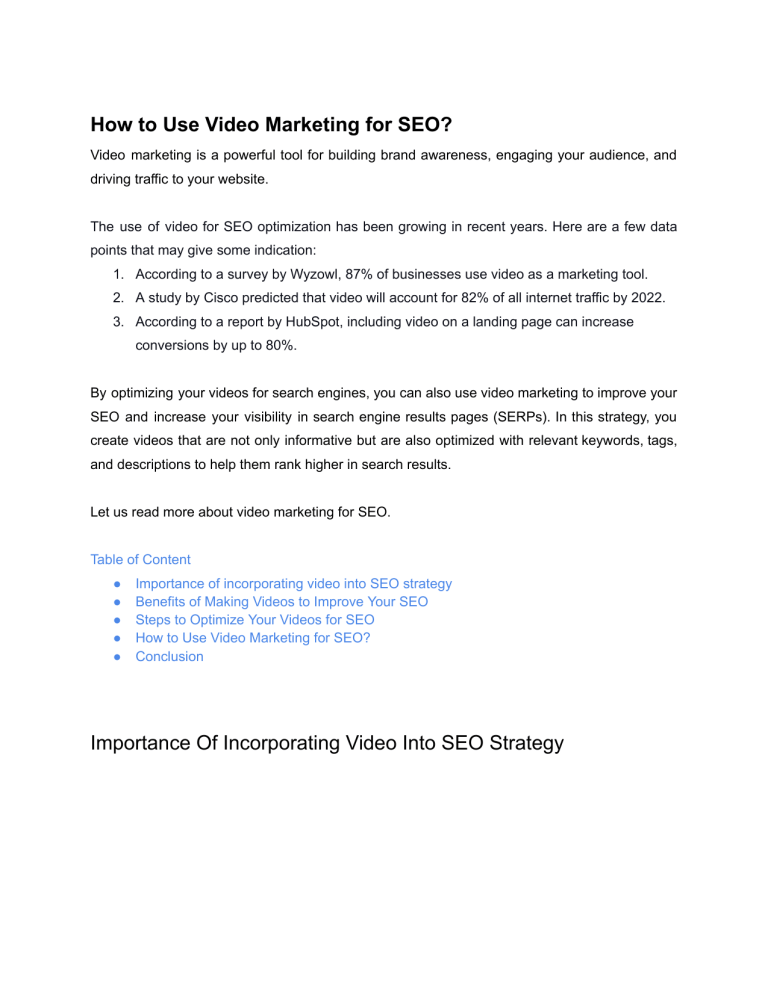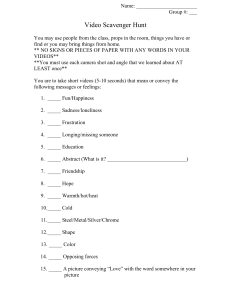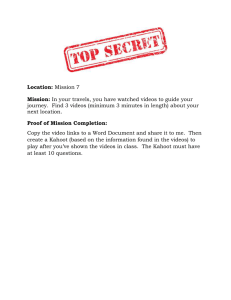
How to Use Video Marketing for SEO? Video marketing is a powerful tool for building brand awareness, engaging your audience, and driving traffic to your website. The use of video for SEO optimization has been growing in recent years. Here are a few data points that may give some indication: 1. According to a survey by Wyzowl, 87% of businesses use video as a marketing tool. 2. A study by Cisco predicted that video will account for 82% of all internet traffic by 2022. 3. According to a report by HubSpot, including video on a landing page can increase conversions by up to 80%. By optimizing your videos for search engines, you can also use video marketing to improve your SEO and increase your visibility in search engine results pages (SERPs). In this strategy, you create videos that are not only informative but are also optimized with relevant keywords, tags, and descriptions to help them rank higher in search results. Let us read more about video marketing for SEO. Table of Content ● ● ● ● ● Importance of incorporating video into SEO strategy Benefits of Making Videos to Improve Your SEO Steps to Optimize Your Videos for SEO How to Use Video Marketing for SEO? Conclusion Importance Of Incorporating Video Into SEO Strategy By incorporating video into your SEO strategy, you can create a powerful online presence that improves your visibility in search results and helps you connect with your target audience in a meaningful way. In the rest of this guide, we'll explore the key steps you can take to create and optimize videos for SEO and how to incorporate video marketing into your overall content strategy. Incorporating video into your SEO strategy can bring several significant benefits, including: ● Increased engagement: Video is a highly engaging medium that can capture your audience's attention and keep them on your website longer. By providing video content that is relevant and informative, you can improve engagement with your target audience and build stronger connections with them. ● Improved user experience: By providing video content on your website, you can improve the user experience for your visitors. Videos help break up long blocks of text, provide visual demonstrations of products or services, and make your content more exciting and dynamic. ● Higher search rankings: Optimized videos can help improve your search rankings and drive more traffic to your website. By incorporating relevant keywords, tags, and descriptions, you can make your videos more discoverable by search engines and increase your visibility in search results. ● Increased brand awareness: Video content is highly shareable and can help spread the word about your brand. Creating informative and engaging videos showcasing your products or services can increase brand awareness and reach a wider audience. ● Better conversion rates: By incorporating video into your sales and marketing strategy, you can improve your conversion rates and drive more leads and sales. Videos can showcase your products or services, provide customer testimonials, and demonstrate how your offerings can solve your customers' problems. Benefits of Making Videos to Improve Your SEO Making videos to improve your SEO can have several benefits, including improved search rankings, increased engagement, more backlinks, better click-through rates, improved user experience, and improved social sharing. In addition, by incorporating video into your SEO strategy, you can create a powerful online presence and connect with your target audience more meaningfully. Here are some benefits of making videos to improve your SEO: 1. Improved search rankings: Videos can help improve your search rankings and visibility in search engine results pages (SERPs). Optimizing your video titles, descriptions, and tags with relevant keywords can increase your chances of ranking higher in search results. 2. Increased engagement: Video is a highly engaging medium that can capture your audience's attention and keep them on your website longer. By providing video content that is relevant and informative, you can improve engagement with your target audience and build stronger connections with them. 3. More backlinks: High-quality videos are more likely to be shared and linked to by other websites, which can increase the number of backlinks to your site. Backlinks are essential in search engine algorithms, so having more high-quality links pointing to your site can improve your search rankings. 4. Improved click-through rates: Videos can help improve click-through rates (CTR) in search results and social media. Eye-catching video thumbnails and titles can entice viewers to click through to your content, increasing your traffic and engagement. 5. Better user experience: Videos can provide a better user experience on your website by breaking up long blocks of text and providing visual demonstrations of your products or services. A better user experience can lead to a longer on-site time, lower bounce rates, and more conversions. 6. Improved social sharing: Videos are highly shareable on social media, which can help increase your brand exposure and drive more traffic to your website. When people share your videos on social media, it can help improve your social signals and improve your search rankings. Steps to Optimize Your Videos for SEO You can optimize your videos for SEO and increase their visibility in search results. Here are some steps to optimize your videos for SEO: 1. Conduct keyword research: Start by conducting keyword research to identify relevant keywords and phrases that people are searching for in your industry. Use these keywords in your video titles, descriptions, and tags to make your videos more discoverable by search engines. 2. Create high-quality content: Ensure your videos provide valuable information to your target audience. This will help increase engagement and encourage people to share and link to your content. 3. Optimize your video title: Your title should be concise, descriptive, and include your primary keyword. Avoid using click-bait titles that are misleading or irrelevant to the content of your video. 4. Write a keyword-rich description: Your video description should include your primary keyword and provide a detailed summary of your video content. Use this opportunity to include additional relevant keywords and links to related content on your website. 5. Add relevant tags: Use relevant tags to help categorize your video content and make it easier for people to find. Include your primary keyword, as well as related keywords and phrases. 6. Include a video sitemap: A video sitemap is an XML file that provides information about your video content to search engines. This can help improve the visibility of your videos in search results. 7. Embed your videos on your website: Embedding your videos on your website can help improve engagement and increase the time people spend on your site. Make sure your videos are placed in a prominent location and are easy to find. 8. Promote your videos: Promote your videos on social media, your email list, and other channels to increase their visibility and encourage sharing and linking. How to Use Video Marketing for SEO? Using video marketing for SEO, you can create engaging, informative content that provides value to your target audience and improves your search rankings. Remember to produce high-quality content, optimize your videos for SEO, host your videos on your website, use eye-catching video thumbnails, and promote your videos on social media. By following these best practices, you can create a powerful video marketing strategy that helps you connect with your target audience and grow your online presence. Here are some ways to use video marketing for SEO: 1. Create high-quality video content: Create high-quality, informative content that provides value to your target audience. This can include product demos, tutorials, testimonials, and other types of content that address your audience's needs and pain points. 2. Optimize your video content for SEO: Use relevant keywords and tags in your video titles, descriptions, and tags to make your content more discoverable by search engines. Consider using closed captions or transcripts to provide additional text that can be indexed by search engines. 3. Host your videos on your website: Hosting your videos on your website can help improve engagement and increase the time people spend on your site. Make sure your videos are placed in a prominent location and are easy to find. 4. Use video thumbnails: Use eye-catching video thumbnails to entice viewers to click through to your content. Your thumbnail should be relevant to your video content and should accurately represent what your video is about. 5. Promote your videos on social media: Promote your videos on social media to increase their visibility and encourage sharing and linking. Use relevant hashtags and tags to make your videos more discoverable. 6. Measure your results: Use analytics tools to measure the performance of your video content and identify areas for improvement. Pay attention to metrics like views, engagement, and conversion rates to gauge the effectiveness of your video marketing efforts. Conclusion Video marketing is a powerful tool that can help improve your SEO and grow your online presence. By creating high-quality video content that provides value to your target audience, optimizing your videos for SEO, hosting your videos on your website, using eye-catching video thumbnails, and promoting your videos on social media, you can create a powerful video marketing strategy that drives traffic, engagement, and conversions. Remember to measure your results and refine your strategy to achieve optimal results. By incorporating video into your SEO strategy, you can stand out from the competition, build brand awareness, and connect with your target audience in a meaningful way. If you want any assistance in video marketing, contact us. Reference https://creatorkit.com/blog/video-marketing-and-seo/ https://www.criteo.com/blog/video-marketing-strategy/ https://nealschaffer.com/video-marketing-seo/ https://www.lemonlight.com/blog/how-will-video-help-seo-ranking/



